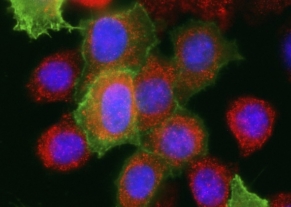A new mechanism to “starve” tumors
In a study directed by Claudia Ghigna – Institute of Molecular Genetics “Luigi Luca Cavalli-Sforza” of the National Research Council in Pavia (Cnr-Igm) – in collaboration with various Italian and international research groups, a novel protein variant expressed only on the surface of tumor blood vessels has been identified. The results of the study were published in Nature Communications.
The research shows how, through the mechanism known as ‘alternative splicing’, cells of the blood vessels are able to produce a novel variant of the UNC5B protein never described before and called UNC5B-D8. Alternative splicing is a so-called ‘cut and sew’ mechanism, in which the bricks forming human genes are assembled in various ways to generate different proteins from the same initial DNA template. These findings turn the spotlight on the still poorly understood role of alternative splicing in the development of tumor blood vessels. From the earliest stages of tumor development, cancer cells stimulate the formation of new blood vessels to support their growth and metastatic dissemination. In the past, an explosion of interest in angiogenesis research has generated the initial insights to develop the first clinically approved anti-angiogenic agents for cancer therapy. Unfortunately, they have showed modest effects in cancer patients, who often develop resistance mechanisms. Thus, a better understanding of tumor vasculature molecular features is essential to develop effective cancer vessel-specific anti-angiogenic approaches. In this context, the present study shows how the UNC5B-D8 protein is produced only by cells of the blood vessel and preferentially by those associated with more aggressive tumors and with a less favorable prognosis. The factor driving the splicing machine to produce the UNC5B-D8 variant is the NOVA2 protein whose expression levels are altered in the tumor vasculature. Consequently, UNC5B-D8 offers an excellent diagnostic and prognostic tool, which could be exploited both as a new marker of tumor angiogenesis, and as a possible molecular target for more effective anti-cancer therapies. The results of this study have been supported by AIRC Foundation for cancer research, which also funded a fellowship for a young researcher, Dr. Davide Pradella, first author of the article.

A ligand-insensitive UNC5B splicing isoform regulates angiogenesis by promoting apoptosis.
Pradella D, Deflorian G, Pezzotta A, Di Matteo A, Belloni E, Campolungo D, Paradisi A, Bugatti M, Vermi W, Campioni M, Chiapparino A, Scietti L, Forneris F, Giampietro C, Volf N, Rehman M, Zacchigna S, Paronetto MP, Pistocchi A, Eichmann A, Mehlen P, Ghigna C.
Nat Commun. 2021 Aug 11;12(1):4872. doi: 10.1038/s41467-021-24998-6
